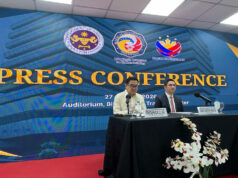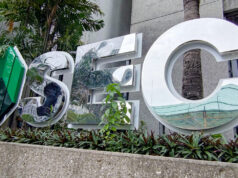Changing the way we buy and sell
The matter of cleaning up Manila Bay and our surroundings boils down to effective waste management. And this, to me, is not just a question of proper disposal. We should address the problem at the source, and this means targeting to minimize if not eliminate waste altogether. And this is where policies like the Food Waste Reduction Act come into place.
Last Monday the House of Representatives approved House Bill No. 8873 or the “Food Waste Reduction Act,” which provides for the creation and regulation of food banks that are to receive edible surplus food donated to charity. The food will be checked by health inspectors before they are turned over to accredited food banks serving the poor.
The bill requires food manufacturers, food establishments, supermarkets with at least 500 meters of selling space, and culinary schools with at least 50 students to set aside edible food surplus, first for health inspection, and then donation to food banks. The food banks will distribute the food to recipients to be identified by local and national government agencies.
I laud the bill and how it aims to deal with food surpluses. In September last year, I wrote about how France in 2016 became the first country in the world to ban supermarkets from wasting food. A law prohibited them from throwing away food that were nearing their best-before dates. Such food must instead be donated to charities and food banks, where they could be used to produce meals for the poor.
Supermarkets that violated the ban could be fined, and their owners or corporate officers jailed. Supermarkets with a footprint of at least 400 square meters — against 500 meters here — are made to sign donation contracts with charities, or face a penalty. Food industries were also encouraged to give excess products directly to food banks from factories.
And then there was a “food waste” supermarket that opened in the United Kingdom also in 2016 that began working with other supermarkets to put such food to good use. “The Real Junk Food Project” opened its first warehouse in Leeds to serve as a “food waste supermarket” where the poor could take food which would otherwise have been thrown away.
But the food is not for free. People are expected to pay what they can afford, or donate their time in volunteering for the project instead; food past expiration date are rechecked if they are still fit for human consumption; and food also get sent to partner cafés and restaurants, which cook them and sell the cooked food also to those in need.
Our Food Waste Reduction law as well as the French and British initiatives of having surplus food donated to charity all work towards reducing waste, or “recycling” food that would have been thrown away. But there are many other ways to address the problem, particularly cutting down on plastic waste that end up in our oceans.

More recently, the New World supermarkets group in New Zealand’s capital of Christchurch started to do away with plastic packaging and plastic wrapping and started selling fruits and vegetables in its supermarkets in the “nude.” And, according to one report, its sales of some vegetables have even soared by up to 300% since the initiative started.
One explanation was that in the past, with the old-style fruit and vegetable stands, people could smell the fruits and vegetables. Buying decisions were influenced by these scents. But in wrapping products in plastic, they were “sanitized” and people were deprived of the experience of being influenced by scents. Removing the plastic wrapping has thus become a driver of sales.
Admittedly, the concept is not new to us. In the Philippines, particularly in small-town markets, fruits and vegetables are usually sold “naked.” Sadly, however, customers bring them home in plastic “sando” bags. In this line, we should bring back the practice of using baskets or market bags or “bayong” not only in urban centers but also in smaller towns.
I believe anything short of a total ban will not work. There shouldn’t be exceptions. We must think of alternatives, rather than exclusions. In the case of New Zealand’s New World chain, the move to eliminate plastic wrapping is in response to a bigger government initiative to totally phase out plastic bags at all retaining points by July 1.
New World started selling produce without plastic packaging after consulting growers and suppliers. It has also put in new refrigeration shelving that produces a mist that helps keep items fresh. This was after noting that “misted produce not only looks better, retains its color and texture, but also has higher vitamin content.” It also installed a “reverse osmosis system” that treats the misting water by removing 99% of all bacteria and chlorine.
Some products are now sold in cardboard trays, or other forms of recyclable packaging. Customers are also asked to bring their own containers for meat and seafood. The grocery chain is also looking into paper alternatives to foil seafood bags, as well as fiber-based deli trays. Under the NZ Plastic Packaging Declaration that the chain had signed, all store and private label packaging must be 100% reusable, recyclable, or compostable by 2025.
Just the other day I was outside at a donut shop. Three young men went in and then went out with a bag of donuts and cups of coffee. After stepping out, they each got a donut out of the bag and started eating. As soon as the bag was empty, it was dropped to the floor, stepped on, and left there. Not sure what happened to their disposable coffee cups after as I had already left. Appalling behavior, really. But it could have been avoided if nothing was taken out of the store.
Customers cannot use — and throw away after — what they cannot buy. If there are no plastic packaging for products, then there will be no plastic packaging going to garbage bins, dump sites, and our oceans. We should eat in rather than take out. And when buying in groceries, we should choose products with minimal packaging. Or go to stores that allow you to use your own reusable container.
I will gladly campaign for Howard Schultz as president of the United States if he can actually stop his entire Starbucks chain worldwide from selling coffee in disposable cups with plastic covers; if he can encourage people to sit down in his stores to drink their coffee rather than take them out; and, to encourage customers to bring their own mugs and reusable containers for takeout coffee. This is a great way to prove that he is beyond ready to lead the free world.
Marvin Tort is a former managing editor of BusinessWorld, and a former chairman of the Philippines Press Council.
matort@yahoo.com



